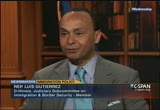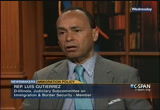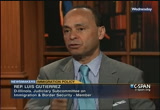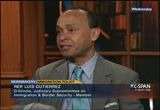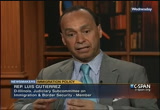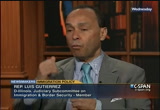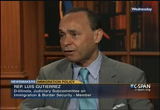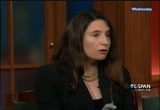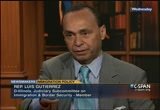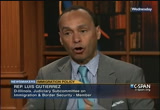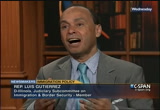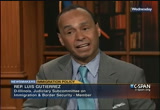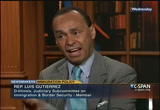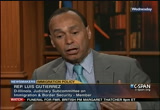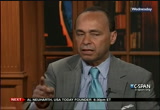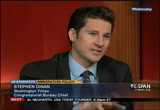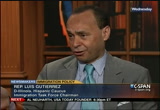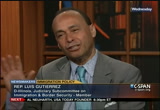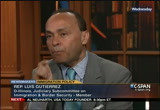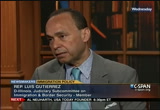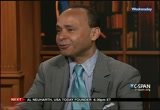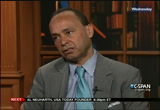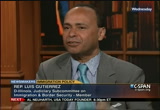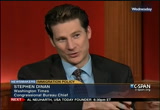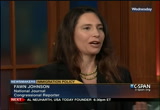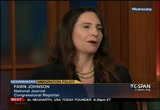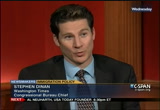tv Newsmakers CSPAN April 21, 2013 6:00pm-6:31pm EDT
6:00 pm
gutierrez. and then, al neuharth who died last week. and nbc senior political editor mark murray. >> this week on "newsmakers," luis fwueterres., member of the house judiciary committee and member of the so-called gang of eight working on immigration in the house. two reporters here to help us ith questions. from "the washington times" and the yarble journal. the first question -- >> you've been working with republicans and democrats in the house on an immigration proposal. can you tell us what is the same and what is different about your proposal from the proposal unveiled by the senate earlier this week. >> interesting, number one, i think the senate is headed in the right direction. i'm happy. they put the proposal forward. i look forward to working with them after we finish the
6:01 pm
proposal in the house. as we were discussing earlier, we're going to be on the same planet. unlike 2006, where you had sensenbrenner and you had a bipartisan comprehensive bill coming out of the senate which you couldn't -- i don't think it's going to be that difficult, though it will be, you know, there will be burdens we have to overcome to reach a bipartisan agreement. it hasn't really changed. it's interesting because i still remember leaving john mccain's office in 2004 after our negotiations, he said, you'll have to convince the democrats to let us have a guest worker program and let it be plentiful to supply the needs of our country. and i said, what do you have to do, john? he said, i have to convince republicans to let your people stay. i don't want to be funny but so
6:02 pm
much is still the same. the agreement between the chamber of commerce, labor, how important it was that they reach an agreement, and that we reach one now. >> one difference i heard, the senate gang of eight is working hard to make sure their bill is revenue neutral and it won't cost anything from a c.b.o. score but i've also heard that house members are not worrying so much about that understanding. >> they want to make sure, up with of the things we are attempting to do is make sure the bill doesn't cost the american people any money and that the expenses incurred in the implementation of the bill are borne by the immigrants themselves as has been much immigration law in the past. now,, i think it's too -- look, we want a rigorous, right, everify system. what does that mean? it's a system, you go get a job, 16 million people change --
6:03 pm
initiate a job every year. that is they go and apply for a job every year. 16 million in the united states. i want a system that when they go, they say, boy, you are verified by the american government as being legally in the united states, legally eable to vote, and verified. and sell that to the employer and if the employer hires somebody that doesn't go through that verification system, i think the weight of the law should fall on them like never seen before. there should be penalties and there should be jail sentences so you don't hire people undocumented, illegally in this country ever again. that's going to cost money to set up that verification system. but let's just agree on this. we are going to set up such a verification system because that guarantees the american people that they feel we're not fooling around and we're not just -- we're going to legalize 11 million people without fixing the system. >> let me ask you about, your group, the house group, had been sort of reticent when we saw you
6:04 pm
at the "christian science monitor" breakfast a month ago, you said you wouldn't confirm the pistence of the group. >> i can't do that now. >> but you issued a joint statement yesterday system of what changed that you guys are able to con number that? why are you now public? are with that close? and are you guys under pressure to come up with conservative and liberal doesn't really fit in this context but are you under pressure to come up with a more conservative plan out of the house to move forward? >> i think you will find a more conservative plan coming out of the house of representatives. the house of representatives, the majority are republicans. within that republican majority, there are many members of the tea party. and so you have a much -- chairman goodlatte is the chairman of the judiciary committee. i mean just look at the array of people in positions of influence and power that are going to have to move this bill through the committees and on the house
6:05 pm
floor. they are in charge. democrats are in the minority. so i think the bipartisanship that is, you've got to get a bunch of your guys and a bunch of my guy, right, and men and women come together and there are more of them than there are of us, you might think you could get more conservative. >> give us specifics, what might be more conservative than what you see in the senate proposal? >> i still really cannot talk with specificity until my colleagues and i the side to make the bill public but let me give you my personal, i'm not saying this is in the bill, if people believe that and i don't want to let them down later on. but i think we're going to make sure in the house of representatives that the -- everybody is talking about triggers. what does that mean? that means for our purposes that before the 11 million can go on that pathway to legalization and ultimately citizenship of the united states of america, we've got to make sure that internally nd externally, we feel secure.
6:06 pm
it's a verification system, i think we'll be rigorous with our verification system, that it has to be implemented. that is everybody has to be verify. i think we'll -- i think -- i want to head in that direction, to give the american people a sense of confidence that that's what we're going to do. i also think the border, right, what are the kinds of things, i want to know that when somebody comes on an airplane or comes through sea that there's some kind of verification system to know if they're oversaying -- overstaying their visa. i will tell you, i think those things are important and if you go back to 2005, when i introduced a bill with now-senator blake, we had many of the same provisions in the bill. what we are saying now is, we are going to make sure that these things happen before the others. but look, can i just say, from my point of view and both of you know me very, very well, you know i have fought against the
6:07 pm
deportation, that has been one of the primary, you wrote about it, you didn't call me, this is going to make luis happy. you didn't call to see if it would make me happy, she knew. i read the article i said, good. don't call me if you know what i think, that's fine. my point is this -- that has been the focus of my mission during the last five years. taking my own president on and my own party on for not doing enough. let me just say this. let's do the internal security and let's do the border security and then 11 million people come out of the shadows, that makes us all safer because we know who they are, they register with the government they give up their fingerprints they go through a background check, that's going to make us all safer. guess what for me, we set them aside. we put them in a safe place until we can do all those other wonderful things and ultimately they'll become american
6:08 pm
citizens. >> let's be clear about this, in must be confusion about legalization and citizenship in all the conversations about this. on the day, hopefully, in your mind when the president signs a bill, what happens to the undocumented population currently in the country and to the ones who have been recently depored who probably would be eligible under the program? >> well first of all, as you know, the senate has agreed that if there's american citizen children or a spouse that remains in the united states of america, that when they petition for their legalization they can petition to have their husband or wife return to them as long as they were not deported for criminal activity. >> but that would happen right after the bill would be signed and there would be no trigger. >> let me put it -- great question and the c-span audience should get the benefit of watching this program. here's how i believe it's going to work. once the president signs the
6:09 pm
bill, i think the president is going to have to take some initiative to stop the deporting as, much like ronlt reagan, just like ronald and, reagan, in 1985, 1986, said, whoa, wait a minute, if i'm going to pass a legalization program, i can't deport the people who will be beneficiaries of the law. the president has to stop them. that doesn't mean if you're a gang banger or drug dealer or murderer ore rapist you're not going to be depored, you're going to be prosecuted to the ll extent of the law and deported. i'm talking about everyone else. they go through a background check, fingerprints, background check, once they pass a background check, not a criminal, good, here's a work permit. go back, check with the i.r.s., maybe got to go back for three years, look at your income taxes make sure you don't owe any money and look the i.r.s. will
6:10 pm
have a job in order to issue people a statement, he's good with me and the i.r.s. or she is good with me and the i.r.s. but they have a work permit. that is not citizenship. they will be in the senate version, for example, it's 10 years, right? they stay in this program for 10 years they work hard they sweat and toil and they learn english, take civics classes, keep their noses clean and contribute to this country and at the end of the 10 years they can say, hey, i did everything required of the program. right? i worked, i raised my children, bought a house, admit me now. and then they'll get a green card. and in the second version, three years a green card they can apply for american citizenship. a lot has been said about the american citizenship. a lot of criticism about how long it takes. look, if i'm a permanent resident of the united states and i apply for my wife, today, depending on what country i'm trying to bing her from, it will take nine to 14 years to bring
6:11 pm
her here legally as a permanent resident. i question the whole thing about 13 years but somebody was undocumented in the united states to reach american citizenship. the important point for me and i believe for immigrant community is there be a pathway to citizenship that ultimately we don't have a two-tiered structure in america. >> not the time frame as much as the end goal. >> i think the end goal is what is essential. first and foremost, 14rks00 today, 1,400 tomorrow that will be deported and it goes undeterd. 1.6 million in the last four years. unprecedented number of deportations. that stops. that is a huge part of what is pushing comprehensive immigration reform. >> and most important, i think what fawn is getting at, there will be a window, i think a six-month window between enactment and accepting applications as long as they
6:12 pm
meet the criteria. you say president obama will need to proactively stop deportation for folks in that six-month window. it in - if we don't hear the bill -- have it in the bill, the president will be hearing for me. >> will you be getting arrested again? >> i will be doing everything necessary to bring attention to the plight of undocumented workers in this country. what is this community? everyone says who are these people, these illegals, they call them. do you know who they are? 2/3's of them have been here more than 10 years. a third of them have been more than 15 years. four million american citizen children, they're the parents of four million american citizen children. nine out of 10 of them have, and i'm talking about american citizens family and upward, that's part of the fabric. and the other thing is, you know what, i love, we're getting away from the silly notion that in
6:13 pm
america somehow we're going to allow some new system that is going to go out and pick up 11 million people. can you imagine the police state? america won't tolerate that kind of police state. the congress of the united tates even the most -- the ugliest, most xenophobic member of congress has never devised a plan, an effective plan he says here's the money and we've got the will to go and pick up 11 illion people. hence many of them are in this country, having children, working hard. you sit down and drink the glass of chardonnay, it came from california you know the likelihood as you're sipping on it it came from the hands of undocumented worker. when you got the lettuce and tomato and the strawberry, you know who picked it. isn't it time we allow the very people who put food on our table, because in the end, we're going to have to make a decision, do we want foreigners
6:14 pm
in foreign countries providing us with our food? or do we want foreigners in our own country under our supervision picking our crops? >> can i get your reaction to what we heard from steve king and louie gohmert earlier this week, tying what happened in boston to the immigration debate saying we need to be careful here because of what happened in boston of how we open up our borders or we do some sort of immigration. >> you know, doing nothing, which is exactly what happens under their proposal, allows america to be less safe. i want to make america safe. on end $18 billion a year immigration enforcement. that's more than we spend on the f.b.i., on secret service, on the a.t.f. come on. if you legalize 11 mem people
6:15 pm
you take a whole bunch of folks off the table. now there's a smaller group of people to use that $18 billion to go after. i want to use the money to go and to be, how can i say it? smarter about getting after the -- so i say comprehensive immigration reform secures our border. as long as i can go to a street corner in just about any major city in the united states of america and get myself a social security card and buy myself a driver's license and buy myself i.d., and it's happening as we speak, how secure do we feel? i'm going to have a verify scation system in place designed to do two things, to make sure we're all authorized to work here and if you hire somebody not authorized, through audits and fines and jail sentences we're going to make that happen. this is luis gutierrez, the advocate of immigrants saying we won't tolerate a system that does not guarantee that people born in this country, american citizens born in this country
6:16 pm
don't get the first crack at an american job. >> two different things, sort of related, there's been a loft talk about the cutoff date in the senate bill are you close to figuring out a cutoff date in the house? >> i have to tell you, we're not there yet. we're not -- i've read there's is december 31, 20 1, that's 14 months. in 2007 it was five years. >> and cutoff date for people who don't know? >> that is who qualifies for the program. well you don't, you have to have a cutoff date because, man, people are read yeg papers and watching the news and saying, and that's why i believe you need to d, when i heard -- >> so if you've been here before -- >> you have to be here before december 31 of 2011 and be able to prove it and when president obama finally, finally responded to the demands of our community in june of 2012 and issued the
6:17 pm
executiverd order, it's deferred action, what did that mean? if you came here as a youngster, under the age of 16 or younger, you came here and went to high school an finished high school we were going to give you deferred action, you were going to be safe from deportation, i have one of the youngsters in my -- working in my congressional office today. he was undocumented, now he's filling out papers. and you get a work permit. we want to put that system in place but in order to get that you have to go through a background check. >> we have a little more than five minutes left. >> how many people, this is sort of tied to that cutoff date and i understand you're not there on the date yet but there's an estimated 11 million currently ere illegally. the senate bill also applies to some who have been recently deported. how many of those 11 million do you expect will qualify? >> they have to go through a
6:18 pm
background check and we're very clear, if you're a criminal we don't want you in our system. i think the immense majority of them. i have to tell you something. e obama administration has instituted a system throughout -- you don't deport 1.6 million people because you have more agents, it's because you have a system prepared to secure communities and through other federal relationships with local authorities that allow you to detain and deport the immigrants. that system is in place and it's very, very vigorous. so i would imagine that a lot of bad actors are gone. and any of the future actors if they apply -- i love for criminal aliens, foreigner, to apply for this program so that we can say, really? you're a criminal? and you applied for the program? and we go right to your house and pick you up an ke port you. >> i have a question for you about the hispanic community, you've been a real advocate for
6:19 pm
them for as long as you've been in congress and you also spend time talking to the spanish language press. can you describe how you see the community as they view this bill and through the senate as opposed to, steve and i both write for english language and what would you want to see happen? >> if you were an anchor of one of the spanish language, you might come and say, luis, 13 years, that's so long. my response is, shall we continue with the deporting as you report on every day? is that what you want? i mean, if urn held in custody, right, by law enforcement in the united states and by immigration agents and you're about to get on the plane and they say to you, by the way, luis, you really, we won't deport you to your country, we're going to give you a work permit, social security card, driver's license,
6:20 pm
you can visit your country, but you can work. or you can get on this plane and we'll deport you but you can't be a citizen for 13 years. the community wants people tb to be in a safe place, free from deportation and to be able to live a normal life without living in terror. which is what the community lives in. so that's the kind of conversation i will be having for them. put them in a safe place and ultimately the issue. the other thing i would say, in 1986, three million people applied to adjust their status, to become legal in the united states, half of them today have in the applied for american citizenship. eight million permanent residents in the united states, i talk to them all the time, i encourage them, who encourages them more than me to become american citizens, they're not american citizens. the important thing is, the ones that did become american citizens and making sure that the system is still there for those who love and cherish this country enough to make a commitment, a lifetime
6:21 pm
commitment to this nation. that's an important principle we must keep alive. >> there's a theory i've heard a couple of immigrant rights' adva cats talk about your role in these negotiations. they that president obama has no credibility with house republicans on a number of different issues but this one in particular. he's too happy to use it as a political issue against them. essentially, their argument is that you -- you're uniquely positioned to be able to do this, because you've earned trust with them. first, how do you describe your role in that? and what's the best role for president obama as this bill goes through congress? should he stay quiet and stay in the white house? are there calls he can make that won't ruin this? what's the best role for him? >> first of all, when i spoke, the president called a few of us to a meeting last january and asked us for our advice. a few of us, suggested him not to draw up a bill. we said to him, mr. president, you need to go around this country and use that bully
6:22 pm
pulpit to make sure that everybody understands what is necessary and to explain and educate the american public about the importance of comprehensive immigration and the urgency. but we asked him not to draw up the bill. some of his aids decided not wid standing our advice to the president not to draw up a bill to show it to the press. what did the president have to do? he had to call john mccain and call up senator graham to apologize for doing that. it seems like we gave him good advice. but having said that, that's the way the system was designed. let the members of the house do negotiation. i get to spend more time with raul labrador then than the president does. therefore i should have a better personal relationship and a relationship base odden trust than the president will ever have with him and i think we can share with one another. whether it's him or sam johnson or carter, look, tomorrow in
6:23 pm
chicago, it's monday, i'll be with paul ryan, the 29th in san antonio, congressman judge carter will be with me at noon with the chamber of commerce in san antonio. they're coming forward so that we can have a debate and discussion with the american people. i don't know that the president of the united states is uniquely in a position to share a stage or podium with anyone, much less members of the house of representatives. for us, i think we break through the logjam because you know what, you spend enough hours in a room talking to somebody, sharing meals with them and discussing the pros and cons, we have a principle in our negotiation, right, never, and this will break the deal. never end a conversation, this will break the deal. always end the conversation, here's what we need to do to reach a conclusion. >> it sounds like you do want him to stay out of it. >> what i want is for the president of the united states to use his bully pulpit as he should, to go around the country and continue to talk about the
6:24 pm
plight of the immigrant community, the necessity for security and to say, as he has, i'm very joyful that the president, the first thing he did was talk to john mccain, to schumer, got on the phone with them and said, great, i like this it's not my version but he was positive. he is saying -- playing a positive role. here's my only point. the moment for the president to be the sole leader on immigration that moment passed. he had four years. the moment is passed. the moment today is for all of us in the house and in the senate, in collaboration with this president because in the end he has to sign the bill, and look, there's going to come some hard times and we'll need him to use that bully pulpit in the future to make sure that when this thing -- it's going to get stymied, there's going to be hick cups, you guys have been around long enough. we need him there so he is critical and essential to this process. >> i want to ask real quick, on gun legislation, does it happen
6:25 pm
in the house? does it happen at all in either chamber? >> i can't see how it's going to happen in the house if they can't get it done in the senate. we have the numbers in the senate, we control the agenda in the senate, i don't see the judiciary committee and house republicans allowing a bill. we need to get it done in the senate in order to have -- i'm still hopeful but we need to get it done in the senate. i don't want to put the burden on them and say -- we're in the minority this members are in the minority. we don't control the system that allows for legislation to be enacted. if we did, i think we could get the votes to pass it. but there'll never be a vote on the legislation. >> congressman, thank you very much for being our newsmaker. appreciate it. >> appreciate it. >> and we're back with our reporters, fawn johnson and steven. the senate dropped the immigration re-- proposal from the gang of eight in the senate. the congressman is part of the
6:26 pm
gang of eight in the house. what's going on with this gang? >> there are a lot of questions about that. we know a lot more about the senate than we do about the house. we have several senate hearings scheduled and then the bill will go through senate committee and to the senate floor. all of that is fairly certain at this point, especially given the makeup of the senate judiciary committee that a bill will get out to the senate floor. the house is more different. you have a gang operating there that until this week when the senate bill came out, the gang in the house didn't even acknowledge publicly they were in existence as a gang, though it was the worst kept secret in washington. in some 's also that ways while it has blessing from house republican leaers to some extent, it's much different than the chairman of the jew dish compare committee in the senate who was active pli hi pushing,, bob goodlatte, he is taking a
6:27 pm
different track altogether. talking about maybe going for some piecemeal bills, doing hearings, trying to see where there are points everyone can agree on and move those bills. it's not clear right now how those all get merged together. i guess i could say, given the political pressure on this, i imagine they'll find a way to do a process, i don't know what the end result of the process is, but i imagine they find a way to get something fairly broad on the house floor at some point. >> does this house gang of eight come up with something, will they have some proposal and if so when would we hear about it? >> i think they will actually have a proposal and i've heard different versions from different members of the gang, of the house gang, a lot of them when they talk they are careful about say, i can't reveal who they are but i think they have legislative text and have for years on some of these provisions.
6:28 pm
i heard they were having trouble with one of the pieces involving a new work visa program, that's also been a bit of an issue in the senate so it's not a surprise they'd be having difficulty. but in the end it wouldn't be difficult for that group of eight to come up with something and put it out there. the only question is,s what happens to it then? they have to be careful about the timing. the other thing i heard is that they want very much to make sure that whatever they put forward is full consensus. not that everybody agrees, they all agree this is the best they can do, they don't want to write what they call place holder language, the kind of language like, we'll figure that out later. but they are competitive with the senate, want to make sure they're not ignored in the process. my guess is, at some point in the next couple of months they'll unveil something. congressman -- >> congressman gutierrez said what comes out of the house is likely to be more conservative than what came out of the
6:29 pm
senate. he talked about triggers. is it likely that this bill has so-called triggers in it in order to get republicans to aprove it, to vote yes? >> i'm sure it has some sort of essentially a benchmark that has to be met. >> before you go forward -- >> citizenship, not legalization. that's the real concern for the congressman clearly is that the citizenship piece, yes, let's make it contingent on some reasonable benchmarks, you can define that however you want. but the legalization needs to be happening relatively quickly or he's going to pull his support. >> you heard something interesting he did say about, there's going to be a window between the time the bill is signed by the president and whenever the legalization happens and he said he would call on the president to stop deportations of most people the rank and file who don't have severe criminal records and what not, he'll call on them to stop those deportations in time. there will be a lot of interesting questions that will
6:30 pm
be posed about enforcement in that and the president will have to answer those at some point. i think it's safe to say that once the bill go into effect, the legalization, whether it's de facto or full strength of the law, will happen almost immediately and then from there, the citizenship will be probably a decade or more down the road. >> and the president's role in all this? what do you hear from the congressman? >> the congressman has been probably the best -- the biggest democratic critic of the president on immigration, particularly in the congress. people a few immigration who said obama helped them. but he got himself arrested protesting the deportation policy in 2010. from what i understand it's been difficult for the president to figure out what his role is because he really is supposed to be doing the cheerleader role for the house and senate rather than actually being prede
62 Views
IN COLLECTIONS
CSPAN Television Archive
Television Archive  Television Archive News Search Service
Television Archive News Search Service 
Uploaded by TV Archive on

 Live Music Archive
Live Music Archive Librivox Free Audio
Librivox Free Audio Metropolitan Museum
Metropolitan Museum Cleveland Museum of Art
Cleveland Museum of Art Internet Arcade
Internet Arcade Console Living Room
Console Living Room Books to Borrow
Books to Borrow Open Library
Open Library TV News
TV News Understanding 9/11
Understanding 9/11

